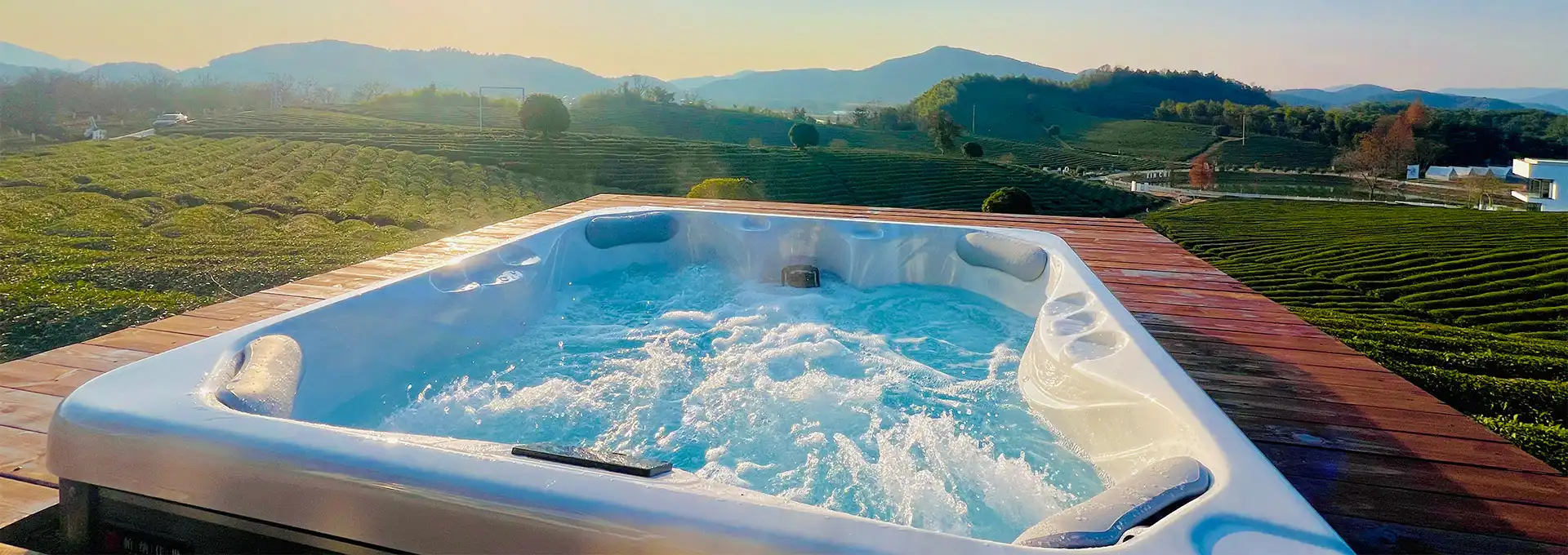Is a Jacuzzi a Hot Tub?
2025-02-24 15:00:39
When it comes to relaxation and hydrotherapy, the terms "Jacuzzi" and "hot tub" are often used interchangeably. However, there's more to these terms than meets the eye. While both offer similar benefits, understanding their differences can help you make an informed decision when considering a purchase or simply trying to use the correct terminology. In this blog post, we'll explore the relationship between jacuzzi hot tub, their similarities, differences, and what you need to know about each.
What's the difference between a Jacuzzi and a hot tub?
To understand the difference between a jacuzzi hot tub, it's essential to delve into their origins and definitions. The term "Jacuzzi" is actually a brand name that has become genericized over time, much like "Kleenex" for tissues or "Band-Aid" for adhesive bandages. The Jacuzzi brothers invented the first submersible pump in 1956, which led to the development of the whirlpool bath. They later created the first integrated jet whirlpool bath in 1968, revolutionizing the industry.
On the other hand, a hot tub is a more general term that refers to any large tub or small pool filled with heated water used for hydrotherapy, relaxation, or pleasure. Hot tubs can come in various forms, including wooden barrel-style tubs, inflatable models, and modern acrylic shells with built-in jets.
The main differences between a Jacuzzi and a hot tub lie in their specific features and brand association:
- Brand specificity: Jacuzzi is a specific brand of hot tubs and related products, while "hot tub" is a generic term for any similar product, regardless of the manufacturer.
- Technology: Jacuzzi products often feature proprietary jet systems and advanced technology, while other hot tubs may have different jet configurations or features.
- Design: Jacuzzi offers a range of designs, including in-ground and above-ground models, while hot tubs from other brands may have more limited options.
- Price: Due to brand recognition and advanced features, Jacuzzi products may be priced higher than generic hot tubs.
Despite these differences, both Jacuzzis and hot tubs serve similar purposes and offer comparable benefits, such as relaxation, stress relief, and hydrotherapy. The choice between a Jacuzzi and another hot tub brand often comes down to personal preference, budget, and specific features desired.
How much does a Jacuzzi or hot tub cost?
The cost of a jacuzzi hot tub can vary significantly depending on various factors, including size, features, brand, and installation requirements. Understanding the price range can help you budget appropriately and determine which option best fits your needs and financial situation.
Entry-level hot tubs, which are often inflatable or made from less expensive materials, can start as low as $500 to $1,500. These models typically have fewer features and may not be as durable as higher-end options, but they can be a good choice for those on a tight budget or looking for a temporary solution.
Mid-range hot tubs, including some Jacuzzi models, generally cost between $3,000 and $8,000. These tubs offer a balance of quality, features, and affordability. They often include better insulation, more powerful jets, and improved energy efficiency compared to entry-level models.
High-end hot tubs and Jacuzzis can range from $8,000 to $20,000 or more. These luxury models often feature advanced technology, premium materials, and extensive customization options. They may include features such as:
- Advanced jet systems for targeted hydrotherapy
- Smart home integration and remote control capabilities
- High-quality filtration and water treatment systems
- Premium sound systems and lighting options
- Energy-efficient pumps and heating systems
It's important to note that the initial purchase price is not the only cost to consider. Other factors that can affect the overall cost of owning a Jacuzzi or hot tub include:
- Installation: Professional installation can range from $500 to $5,000 or more, depending on the complexity of the job and any necessary site preparation.
- Electrical work: Many hot tubs require a dedicated 220-volt electrical circuit, which may cost $500 to $1,500 to install.
- Ongoing maintenance: Regular cleaning, water treatment, and filter replacements can cost $200 to $600 per year.
- Energy costs: Operating a hot tub can add $20 to $50 to your monthly electric bill, depending on usage and energy efficiency.
- Repairs and replacements: Budget for potential repairs or part replacements over the life of the hot tub.
When considering the cost of a Jacuzzi or hot tub, it's essential to factor in both the initial purchase price and the long-term costs of ownership. Investing in a higher-quality model may result in lower operating costs and a longer lifespan, potentially saving money in the long run. Additionally, some retailers offer financing options, which can make purchasing a hot tub more accessible for those who don't want to pay the full amount upfront.
Are Jacuzzis and hot tubs good for you?
Jacuzzis and hot tubs offer a range of potential health benefits, making them popular choices for both relaxation and therapeutic purposes. While it's always advisable to consult with a healthcare professional before using a hot tub for medical reasons, many people find that regular use can contribute positively to their overall well-being.
Some of the potential health benefits associated with using Jacuzzis and hot tubs include:
- Stress relief and relaxation: The warm water and massaging jets can help reduce stress and promote relaxation by releasing endorphins and soothing tense muscles.
- Improved sleep: Soaking in a hot tub before bedtime can raise your body temperature, which, when followed by the natural cool-down process, may help you fall asleep faster and enjoy deeper sleep.
- Pain relief: The combination of heat, buoyancy, and massage can help alleviate various types of pain, including arthritis, fibromyalgia, and lower back pain.
- Enhanced cardiovascular health: Regular hot tub use may help lower blood pressure and improve circulation, potentially benefiting heart health.
- Muscle recovery: Athletes and fitness enthusiasts often use hot tubs to help with muscle recovery after intense workouts or competitions.
- Improved flexibility and range of motion: The warm water can help increase flexibility and reduce stiffness in joints and muscles.
While these potential benefits are appealing, it's important to use Jacuzzis and hot tubs responsibly and be aware of any potential risks. Some precautions to keep in mind include:
- Limiting soak time to 15-30 minutes to avoid overheating or dehydration
- Maintaining proper water temperature (typically between 100°F and 104°F)
- Staying hydrated by drinking water before, during, and after hot tub use
- Avoiding alcohol consumption while using a hot tub
- Keeping the hot tub clean and properly maintained to prevent bacterial growth
Certain individuals, such as pregnant women, people with heart conditions, and those with open wounds or skin infections, should consult with their healthcare provider before using a hot tub. Additionally, it's crucial to supervise children around hot tubs and ensure they don't overheat or spend too much time in the water.
When used responsibly, Jacuzzis and hot tubs can be a valuable addition to your health and wellness routine. Many users report improved quality of life, reduced stress levels, and better sleep after incorporating regular hot tub sessions into their routines. The combination of hydrotherapy, heat therapy, and massage can provide a holistic approach to relaxation and pain management.
Moreover, the social aspect of hot tubs shouldn't be overlooked. They can serve as a gathering place for family and friends, promoting social connections and bonding. This social element can contribute to improved mental health and overall well-being.
In conclusion, while Jacuzzi is a specific brand of hot tub, both terms refer to similar products that offer comparable benefits. Whether you choose a Jacuzzi or another hot tub brand, you can enjoy the relaxation, health benefits, and social opportunities these products provide. When considering a purchase, weigh the costs, features, and potential benefits to find the option that best suits your needs and lifestyle. With proper use and maintenance, a jacuzzi hot tub can be a valuable investment in your health and happiness.
For more information on jacuzzi hot tub installations and our products, please feel free to contact us at info@iparnassus.com.
References
- Jacuzzi. (n.d.). Our Story. Retrieved from https://www.jacuzzi.com/en-us/our-story
- Home Depot. (n.d.). Hot Tub Buying Guide. Retrieved from https://www.homedepot.com/c/ah/hot-tub-buying-guide/9ba683603be9fa5395fab90124a115fb
- Poolsupplyworld.com. (n.d.). Hot Tub Cost: A Complete Breakdown. Retrieved from https://www.poolsupplyworld.com/hotTubCost.cfm
- Mayo Clinic. (2020). Are hot tubs safe? Retrieved from https://www.mayoclinic.org/healthy-lifestyle/adult-health/expert-answers/hot-tubs-health/faq-20058365
- Arthritis Foundation. (n.d.). Warm Water Works Wonders on Pain. Retrieved from https://www.arthritis.org/health-wellness/healthy-living/physical-activity/other-activities/warm-water-works-wonders-on-pain
- Sleep Foundation. (2021). Can Taking a Hot Bath or Shower Help You Sleep? Retrieved from https://www.sleepfoundation.org/sleep-hygiene/shower-before-bed
- American Heart Association. (2019). Hot Tub Safety. Retrieved from https://www.heart.org/en/health-topics/consumer-healthcare/what-is-cardiovascular-disease/hot-tub-safety
- U.S. Consumer Product Safety Commission. (n.d.). Safety Barrier Guidelines for Residential Pools. Retrieved from https://www.cpsc.gov/s3fs-public/362%20Safety%20Barrier%20Guidelines%20for%20Pools.pdf
- Energy.gov. (n.d.). Energy-Efficient Home Design. Retrieved from https://www.energy.gov/energysaver/energy-efficient-home-design
- Watkins Wellness. (n.d.). Hot Tub Health Benefits. Retrieved from https://www.watkinswellness.com/en-us/health-wellness/hot-tub-health-benefits
Send Inquiry
Related Industry Knowledge
- Unlocking the Smart Potential: How Do Hotel Hot Tubs in the Middle East Integrate Advanced Controls?
- Can You Winterize a Swim Spa?
- How Do You Power a Hot Tub?
- How to Choose a Swim Spa?
- How Much Does a Swim Spa Cost?
- How to Maintain an Outdoor Swim Spa?
- How Wide is a 4-Person Hot Tub?
- How Do I Maintain Proper Water Chemistry and Sanitation in My Outdoor Swimming Spa?
- Can you rent a swim spa?
- How Often to Change Swim Spa Water?
_1768872582663.webp)


